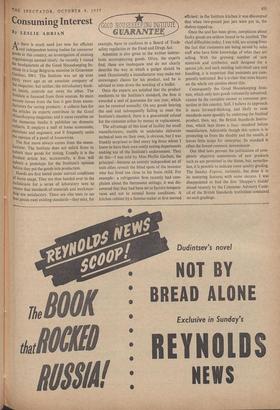Consuming Interest
fly LESLIE ADRIAN As. there is much need just now for efficient and independent testing bodies for consumer goods in this country, an investigation of existing organisatiops seemed timely. So recently I visited the headquarters of the Good Housekeeping In- stitute in a large Belgravia mansion in'Grosvenor Gardens, thirty SW1. The Institute was set up over years ago as an associate company of the magazine; but neither,The introductory book- let insists, controls nor owns the other. The !nstitute is financed from three sources. Its main income comes from the fees it gets from manu- facturers for testing products: it collects fees for the articles its experts contribute to the Good lious'ekeeping magazine; and it earns royalties on the numerous books it publishes on domestic subjects. It employs a staff of home economists, dieticians and engineers, and It frequently seeks the opinion of a panel of housewives. The first move always comes from the manu- facturer. The Institute does not solicit firms to submit their goods for testing. Usually it is the finished article but, occasionally, a firm will submit a prototype for the Institute's opinion before they put the goods into production.
Goods are first tested under normal conditions of home usage. They are then handed over to the technicians for a series of laboratory tests to ensure that standards of materials and workman- ship are satisfactory. There are also tests to see that goods meet existing standards—they may, for
GOOD HOUSEKEEPING INSTITUTE
GUARANTEE
example, have to conform to a Board of Trade safety regulation or the Food and Drugs Act.
Attention is also given to the written instruc- tions accompanying goods. Often, the experts find, these are inadequate and do not clearly describe the way in which a gadget should be used. Occasionally a manufacturer may make too extravagant claims for his product, and he is advised to tone down the wording of a leaflet.
Once the experts are satisfied that the product conforms to the Institute's standard, the firm is awarded a seal of guarantee for one year, which can be renewed annually. On any goods bearing the seal and subsequently failing to meet the Institute's standard, there is a guaranteed refund for the customer either by money or replacement.
The advantage of this kind of facility for small manufacturers, unable to undertake elaborate technical tests on their own, is obvious, but I was frankly surprised to find many big firms whom I know to have their own costly testing departments making use of the Institute's endorsement. They do this—I was told by Miss Phyllis Garbutt, the principal—because an entirely independent set bf tests often reveals the blind spots of the inventor who has lived too close to his brain child. For example: a refrigerator firm recently had com- plaints about the thermostat settings; it was dis- covered that they had been set to factory tempera- tures and not to normal home conditions. A kitchen cabinet by a famous maker at first seemed efficient; in the Institute kitchen it was discovered that when two-pound jam jars were put in, the shelves tipped up.
Once the seal has been given, complaints about faulty goods are seldom found to be justified. The chief difficulties today, I was told, are arising from the fact that customers are being served by sales staff who have little knowledge of what they are selling. With the growing number of new materials and synthetics, each designed for a special job, and each needing individual care and handling, it is important that assistants are com- petently instructed. But it is clear that store buyers on the whole are careless about this.
Consequently the Good Housekeeping Insti- tute, which only tests goods voluntarily submitted, cannot be the complete answer to consumer pro- tection in this country. Still, I believe its approach is more forward-thinking, and likely to raise standards more speedily by endorsing the finished product, than, say, the British Standards Institu- tion, which lays down a basic standard before manufacture. Admirable though this system is in protecting us from the shoddy and the unsafe, it leaves little scope for enterprise. Its standard is often the lowest common denominator.
Our libel laws prevent the publication of com- pletely objective assessments of new products such as are permitted in the States, but, neverthe- less, it is possible to indicate some quality grading. The Sunday Express, curiously, has done it in its motoring features. with some success. I was disappointed to find the first 'Shopper's Guide' issued recently by the Consumer Advisory Coun- cil of the British Standards Institution contained no such gradings.






















































 Previous page
Previous page